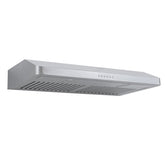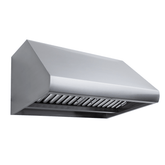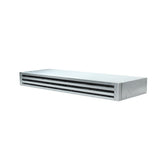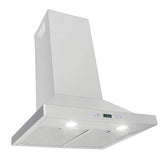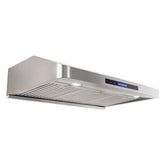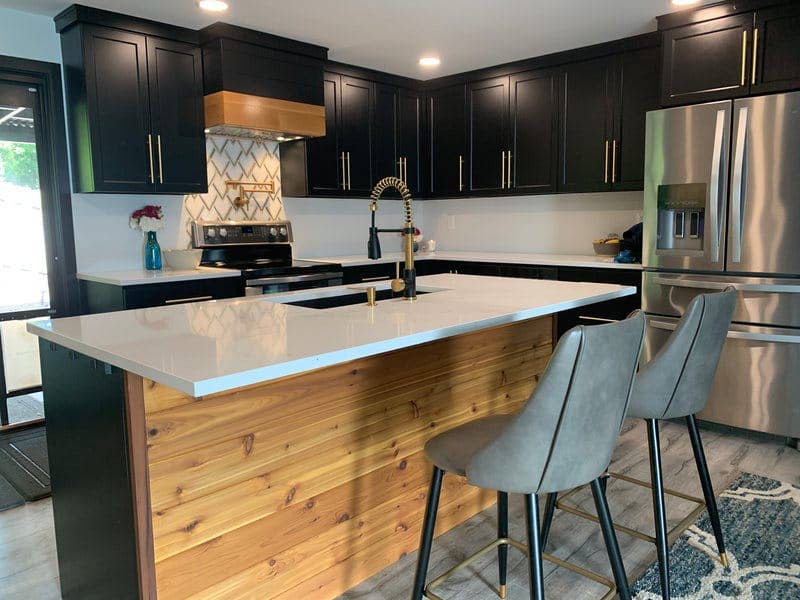There are so many types of kitchen appliances, and if you have kids around, safety is especially important.
While you shop, you might wonder: are range hoods dangerous?
A range hood is not dangerous. It reduces the risk of grease fires and keeps cooking exhaust and odors out of your home.
To ensure your range hood is safe to use and runs efficiently, there are a few best practices to keep in mind.
When you receive your hood, turn it on and inspect it for damage.
Once you receive your hood, it’s important to inspect it for damage. Dents or scratches aren’t dangerous, but a problem with the motor or circuit board can cause issues down the line.
Operating a damaged range hood can be dangerous. So, be sure to test all of the fan speeds and make sure the motor runs smoothly.
Here is a quick video on how to inspect your hood once you receive it.
Mount your range hood between 28 and 36 inches from the cooktop.
When installing your hood, one of the most important things to get right is the mounting height. In indoor kitchens, mount your hood between 28 and 36 inches above the cooktop. This is far enough away from the cooktop that your hood won’t get damaged from heat. A hood mounted under 28” above the cooktop can be a fire hazard.
To learn more about range hood mounting height, check out this complete guide.
Use residential hoods in residential environments, and commercial hoods in commercial environments.

Range hoods are divided into two broad categories: residential and commercial. Residential hoods should only be used in homes. Commercial hoods, on the other hand, can be used in restaurants, labs, and other environments.
Do not install a residential hood in a commercial environment. Commercial hoods are much more powerful than residential hoods. They are often equipped with fire suppression systems, which residential hoods don’t have.
Commercial hoods are made of higher quality materials that can handle heavy grease, corrosion, harsh weather, and the like. So if you install a residential hood in a commercial setting, it may wear down quickly or break.
Most residential hoods likely won’t be able to keep up with the heavy grease or contaminants that your range or grill produces. This can be quite dangerous.
So, just ask yourself this question: is my hood for my home or a restaurant or business?
Most companies will specialize in either residential or commercial hoods – not both. At Proline, we specialize in residential hoods. Our hoods are commercial-grade but don’t come with fire suppression systems.
Clean your filters every three to four weeks.
Keep your filters clean to prevent heavy grease buildup inside your hood and in your ductwork. Grease buildup impedes the flow of air to the outside which leads to more grease buildup. If left unchecked, you may be at risk of a grease fire. But as long as you clean your filters every few weeks, your hood should stay in great condition for years.
If you have a ductless hood, be sure to replace the charcoal filters every month or so as well.
Save the max speed for emergencies only.
It’s not dangerous to run your hood on max speed all the time. But you won’t get the most out of your range hood if you do.
The right hood will have more power than you need while cooking your everyday meal. If you have more cooking exhaust than normal, you can turn your hood up and evacuate the smoke or smell quickly. Powerful hoods are incredibly efficient at removing heavy smoke fast.
Once the smoke is cleared, you can go back to the lower speeds.
If you’re looking for a powerful range hood, check out this link!
Don’t mount your range hood over a green egg.
Green egg grills get very hot and can produce a lot of smoke. So we don’t recommend mounting a range hood over a green egg due to its extremely high temperatures
If you want to mount a hood over your green egg, do a little more research first. Contact your manufacturer to see what they recommend. At the very least, mount your hood between 36 and 42 inches from the cooktop, instead of 28-36 inches.
Is a range hood really necessary?
The more you cook, the more necessary a range hood is. You don’t want pesky cooking odors and thick smoke lingering in your kitchen for days. A range hood can keep your air clean and fresh!
Whether or not you cook often, a range hood is great to have in any home. It moves smoke, cooking exhaust, and other harmful contaminants out of your kitchen. This improves indoor air quality – and indoor air can be a lot dirtier than outdoor air.
Is it bad to not have a range hood?

That depends on your cooking habits and the ventilation in your home. If your home is already well ventilated, it’s not bad. But if your home’s not ventilated well and you cook a lot, you should consider buying a professional hood. Prolonged exposure to smoke, cooking exhaust and indoor air pollutants are not good for your health.
You might consider using an electric stove instead of a gas stove to improve your carbon footprint and your health. Learn more about the differences between gas and electric stoves here.
Or, for more information on range hood safety, check out our article ‘Is it safe to cook without a range hood?’
What happens if the range hood is too high?
If your range hood is mounted too high, some cooking fumes will escape into your kitchen instead of going to the outside of your home. In short, your range hood will be less efficient. This means you may have to run it more often compared to a hood that is mounted appropriately.
What is the point of a range hood?
As you cook, your stove produces harmful contaminants, gas stoves in particular. Your food produces a lot of smoke, especially if you fry or grill – cooking odors too! The point of a hood is to take all that pesky cooking exhaust and vent it to the outside. There are many other ways you can improve your indoor air quality, but a range hood is one of the most efficient.
Related Articles
Is it safe to cook without a range hood?
20 Best Range Hoods For Your Kitchen
